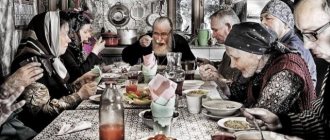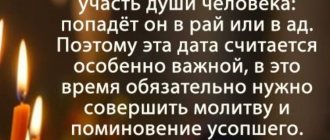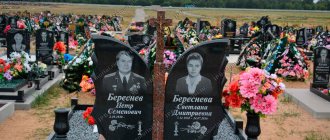Posthumous fate of the soul
What happens to the soul in the afterlife? And do the dead see us after death? According to Orthodox teaching, human nature has two components: soul and body. The body consists of physical matter. Therefore, it is subject to material laws, that is, it is mortal and subject to decay. The soul has a spiritual, not a material essence. While a person is alive, it is connected to the body. But at the moment of death, the soul leaves him. She continues her independent eternal existence in another world (“The Secret Life of the Soul after Physical Death”).
Do the dead see us after death?
Where do animal souls go?
True believers claim that the soul is a subtle matter, which is an invisible connection between the earth and the other world. On the part of atheists, it is believed that this is simply personal individuality and acquired experience. And if something is clear with the question of where the soul goes after the death of a person, then with animals this is not certain. Where do the souls of our pets go? And do they even have them?
Where does a dog's soul go?
Even considering the phrase “animate object,” one can come to the conclusion that every living thing on earth has a soul. Dogs also have a soul, but it is not as developed as a human’s.
There are several versions about what happens to the smaller brothers after death:
- Many scientists agree that the soul of dogs is sent into the general energy field. There she lives until she is incarnated in a new body.
- The second theory, which has not yet gained much development and evidence. The souls of domestic dogs living with a person, subject to great attachment, become attached to the human one. In this way she develops and joins eternity. But this only applies to those who are constantly near the owner, and not on the street.
- In the third theory, experts claim that after the death of a dog, its soul unites with the same matters. After this, forming one, whole soul, it moves into a new person.
There are many theories on this topic, but you can choose which one is closer by faith.
Where do cat souls go?
As with dogs, there is no clear answer. Some religions say that cats do not have a soul at all and as a result, after they die, they disappear forever. However, there is also a statement that there is a soul even in stone, and accordingly cats are endowed with it.
What opinions exist on this matter:
- Psychics believe that cats have souls. But, like dogs, theirs is different from humans. However, the chance to meet your pet in the other world, although small, is there.
- The second theory from scientists. It consists of relocating the soul into the energy field of our planet. This is how they maintain the existence of the Universe.
Heaven and Hell
The afterlife state of the soul directly depends on its spiritual appearance at the time of separation from the body. Heaven is being with God. Righteous souls, even in earthly life, sought to unite with Him. And they made efforts for this. That is, they repented and were cleansed of sins, prayed, and participated in the grace-giving Church Sacraments. Therefore, death for the righteous is a long-awaited meeting with the Lord.
Hell is the absence of God. This is the state of sinful souls. In earthly life they did not seek the Lord, they did not want to let Him into their hearts. It was not Divine grace that took root in such souls, but sins and passions. Sin is a person’s violation of the moral law (commandments) laid down in him by God. This is a fatal departure from a righteous life. Sin distorts the existence of human nature intended by the Creator and alienates the soul from Him. Passion is dependence on sin, a disease of the soul that completely subjugates the sinner. The Almighty cannot be with a person against his will. The sinful soul became a captive of the devil during its lifetime. After death, she continues to be at the mercy of dark forces.
“He who has alienated himself from God over time, who has acquired all ungodly properties, who has voluntarily rejected assimilation to God, naturally departs after his death to a country doomed to the home of creatures rejected by God” (Complete Collection of the Works of St. Ignatius Brianchaninov. Volume 4).
The soul has free will and the ability to repent only until separation from the body. During life, the spiritual and earthly essence of a person form one whole, so he can change morally. But after death, he can no longer do anything on his own to save himself. However, prayers and good deeds of living people can help the deceased. After all, the Church of Christ is a single organism. A living body, consisting of both living Christians and the deceased who are in another world. And physical death is not an obstacle to their spiritual connection. After all, the basis of this connection is love and compassion.
Souls of children and unbaptized
Separately, it is necessary to note two questions to which many are looking for answers. Is the first one where the child's soul goes to heaven or hell after an abortion? In our world, having an abortion is not a problem, and if someone is not ready to raise children, then they easily undergo this operation.
Some churches claim that such a procedure is a sin and the baby's soul will go to hell. But this is often done only with the aim of scaring. Of course, the baby’s soul will be sent to heaven. He did not have time to sin and is completely pure, so he will be next to God.
Another question is, where does the soul go after the death of an unbaptized person, be it a child or an adult? In Orthodoxy, baptism is mandatory. Why is that? So that a person or baby does not die unbaptized. This means that a person did not make his choice during life and did not believe in the Lord. It is believed that they will not suffer after death, but there is no way for them to go to heaven.
The first 40 days after death
In Orthodoxy there are no dogmas approved by the Church about what happens to the soul immediately after death. Church Tradition answers these questions. The first two days after separation from the body, the soul is free and remains on earth. This is discussed in the work “The Last Times According to the Teachings of the Church Fathers.” She can visit places dear to her. This is the answer to whether the dead see us after death.
On the third day, the soul ascends to Heaven and worships God. She is also shown the palaces of paradise, where the righteous found peace and joy.
On the ninth day, the Lord is worshiped again, after which the soul moves to hell. There she sees the horror of being without God and the suffering of sinners. On the fortieth day, the soul appears before the Creator for the third time. A private preliminary trial is being held over her. He will determine the place of residence of the soul until the Last Judgment, which will occur after the Second Coming of Christ.
Private judgment is associated with the passage of the soul through ordeals. That is, through tests that reveal how ingrained certain passions are in her. A person gives an answer for his entire life. The “accusers” are evil spirits who want to get the soul. The angels protect her. They point to a person’s good deeds and do not allow repentant sins to be imputed to him. Therefore, it is much easier to go through ordeals for those who during their lifetime tried to save their soul. The doctrine of ordeals was formulated in the 5th century in the “Life of St. Basil the New.” This work is apocryphal (non-canonical) in nature. The doctrine of ordeals expressed in it is not a dogmatic statement.
To the question “do the dead hear us?” should be approached from a spiritual point of view. Church and home prayer commemoration helps in going through ordeals and gaining the Kingdom of Heaven. As well as good deeds performed for the repose of the soul (for example, alms). If the soul is in hell, remembrance eases its torment. By the grace of God, prayers can even contribute to the justification of a sinner at the Last Judgment. “The dead are helped by offerings made by the living” (Works of St. Ephraim the Syrian).
How do you remember on the 40th day?
Custom prescribes visiting the church , visiting the grave and organizing a memorial meal .
What to do in church
In Orthodoxy, on this day, the relatives of the deceased need to come to church. A note “On repose” must be submitted to the church . It indicates the full name of the deceased and the names of other deceased relatives and friends. You need to light a candle for repose and pray. If a funeral or memorial service is going on in the church at that moment, you cannot immediately leave the church.
Food prepared at home should be placed on the funeral table in the temple. This is almsgiving in honor of the deceased. Cookies, sweets, fruits, wine, cereals, sugar, flour, vegetable oil are suitable, but not meat, sausage or fish. The treat should not harm, and perishable food cannot be given out as alms.
Visit to the cemetery
A visit to the cemetery at the wake of the 40th day is an obligatory part of the ritual of farewell to the deceased. You need to bring an even number of fresh or artificial flowers and a lamp to the grave.
On the fortieth day, it is customary to sort through the things of the deceased person. Belongings should be taken to church or distributed to those in need, keeping only the most memorable ones for yourself. This is considered a good deed, which will be counted towards the soul of the deceased when determining its fate at God's Judgment. Orthodox traditions do not encourage throwing away the belongings of the deceased.
What else should relatives do?
- The first and most important thing is to pray for the salvation of the soul of the deceased and ask the Lord to favor it.
- At least temporarily give up bad habits: alcohol, smoking, gambling. This is a kind of sacrifice in the name of saving the soul of the deceased, and for non-religious people it is a reason to become a little better.
- During the wake, you cannot drink alcohol, have fun, or sing songs.
- You need to dress modestly for a funeral. Calm clothes in muted colors will maintain the atmosphere of the funeral ritual.
- Show endurance and patience. Article How to respond to condolences about a death? will help you prepare for decent behavior with guests.
- Consider a memorial page for the deceased in advance. A decent obituary will help to spend the 40th day of commemoration meaningfully and more often remember the good deeds and character traits of a person .
- Don't refuse funeral gifts. For relatives and friends of the deceased, contributing money to ordering a monument will be the last gift to their friend, colleague or loved one .
Do the dead see us after death?
Does the soul of a deceased person see its loved ones? As already mentioned, in the first days after death the soul is free to visit any earthly place. Therefore, she can see her loved ones too. There is numerous evidence of this from people who returned from the other world. They saw those around them and tried to communicate with them. But due to the invisibility and intangibility of the soul, this was to no avail.
But is this possible after the soul has gone through a private trial? Archpriest Andrei Efanov notes that holy souls can take care of their living loved ones. For example, someone in their family may have a new martyr who prays for their descendants in paradise. Thus, he spiritually “sees” his relatives. Christians all over the world turn to the righteous, canonized. God's saints help convey our requests to the Lord, and also, according to His will, perform miracles. Sinful souls, according to Archpriest Andrei Efanov, are exhausted and themselves need our prayerful help.
Is contact possible between the soul of the deceased and its living loved ones? Schema-Archimandrite Placida (Dezei) notes that this can happen
“Only with God’s permission. And all types of magical evocation of the dead have always been condemned. Moreover, both by the Word of God and by Christian consciousness.”
The Old Testament says:
“You must not have... a soothsayer... a sorcerer, a charmer, a conjurer of spirits, a magician, and a questioner of the dead; For anyone who does this is an abomination to the Lord” (Deut. 18:10-12).
So, sometimes, by the will of God, the souls of the dead can enter into visible interaction with the living.
Examples of contacts between the souls of the dead and the living
Priest Alexander Avdyugin, answering the question “do relatives meet after death?”, spoke about the events that happened to his friends. Every night a deceased father named Gregory appeared to them. No one could understand the reasons for these “visits”. But in the mood of the deceased, sadness and anxiety were felt every time. The narrator found out that the funeral service was held for his father, but in the future he was almost never remembered in prayer. The children of the deceased were unchurched. The priest taught them to pray for the repose of their father's soul.
Soon after, the children found a note in the family photo album. Her father left her while still alive, but already anticipating his imminent death. In the note, he asks his children and grandchildren to perform the funeral service for him. But not as Gregory, but according to the name Dimitri given at Baptism. A funeral service was performed for my father, taking into account his real baptismal name. Also, children and grandchildren began to regularly remember him in prayers. After this, the deceased stopped bothering his relatives with his visits.
Priest Vladimir Strakhov tells whether the dead can help the living. One day, after a service, an old woman came to his church with a request to give communion to her son. The woman gave his first name, last name and residential address. On the same day, Father Vladimir went with the Holy Gifts to the old woman’s son.
A student lived at the address indicated. His name was the same as the old woman indicated, but he was very surprised by the arrival of the priest. It turned out that his mother died long ago. Father Vladimir noticed a portrait of his mother in the guy’s apartment. Father immediately recognized him as the old woman who came to the temple. The son was very surprised, but still agreed to confess and receive communion. He repented for a long time and sincerely of the sins accumulated throughout his life. Then the young man reverently accepted the Body and Blood of Christ.
Soon Father Vladimir was informed that this guy had died unexpectedly and was asked to serve a memorial service for him. So the late mother, by the will of God, saved her son from death without repentance and Communion.
Prayers for the departed
A short prayer for the deceased
Rest, O Lord, the souls of Your departed servants: my parents, relatives, benefactors (their names), and all Orthodox Christians, and forgive them all sins, voluntary and involuntary, and grant them the Kingdom of Heaven.
Prayer for the deceased up to 40 days
Remember, O Lord our God, in the faith and hope of the life of Thy eternal newly departed servant (or Thy servant), named, and as good and a lover of mankind, forgiving sins and consuming iniquities, weaken, forgive and forgive all his voluntary and involuntary sins, exposing him to Thy holy second coming into the communion of Thy eternal blessings, for the sake of the One who has faith in Thee, the true God and Lover of mankind. For You are the resurrection and the life and the rest of Your servant, named Christ our God. And we send glory to You, with Your beginningless Father and with the Most Holy Spirit, now and ever and unto ages of ages, Amen.
Prayer for the deceased after 40 days
Remember, O Lord our God, in the faith and hope of the eternal life of Your departed servant, our brother (name), and as Good and Lover of mankind, forgiving sins and consuming untruths, weaken, forsake and forgive all his voluntary and involuntary sins, deliver him eternal torment and fire of Gehenna, and grant him the communion and enjoyment of Your eternal good things, prepared for those who love You: even if you sin, do not depart from You, and undoubtedly in the Father and the Son and the Holy Spirit, Your glorified God in the Trinity, Faith, and Unity in the Trinity and the Trinity in Unity, Orthodox even until his last breath of confession.
Be merciful to him, and faith, even in You instead of deeds, and with Your saints, as You give generous rest: for there is no man who will live and not sin. But You are the One besides all sin, and Your righteousness is righteousness forever, and You are the One God of mercies and generosity, and love for mankind, and to You we send glory to the Father and the Son and the Holy Spirit, now and ever, and to the ages of ages. Amen.
Prayer for the deceased on the year since death
From the funeral service
Troparion tone 8
Build with the depth of wisdom all things humanely and bestow upon all that are useful, O One Creator, rest, O Lord, the soul of Thy servant (or: the soul of Thy servant; for many: the souls of Thy servant), for place their trust in Thee (or for many: place their trust), the Creator and the Creator and our God. Glory, even now: To you and the Wall and the Refuge of the Imams, and the Prayer Book favorable to God, Whom You gave birth to, O Blessed Mother of God, salvation of the faithful











